
BBC Sherlock Fan Forum - Serving Sherlockians since February 2012.
- besleybean
- Threatened Knighthood
 Offline
Offline 
- From: Carnoustie, Angus, Scotland.
- Registered: October 4, 2012
- Posts: 21,380
Re: So what do you think about our Consulting Detective?
I concur.
---------------------------------------------------------------------------------------------------------------------------------------------------------------
- NotYourHousekeeperDear
- Cipher Expert
 Offline
Offline - From: Australia
- Registered: September 19, 2013
- Posts: 168
Re: So what do you think about our Consulting Detective?
RavenMorganLeigh wrote:
And John has some serious anger-management issues. The yelling, the punching, strangling, etc, ... Thank goodness he has Mary to help him calm down a bit.
We should also be grateful that Sherlock's body seems to have a magical capacity to recover from torture, beatings etc. Hardly a scratch by the end of the episode.
------------------------------------------------------------------------------------------------------------------------------------------
"You can always tell a good Chinese place by examining the bottom third of the door handle"
- besleybean
- Threatened Knighthood
 Offline
Offline 
- From: Carnoustie, Angus, Scotland.
- Registered: October 4, 2012
- Posts: 21,380
Re: So what do you think about our Consulting Detective?
Well he does claim to indestructible!
---------------------------------------------------------------------------------------------------------------------------------------------------------------
- KeepersPrice
- Official Blogger
 Offline
Offline 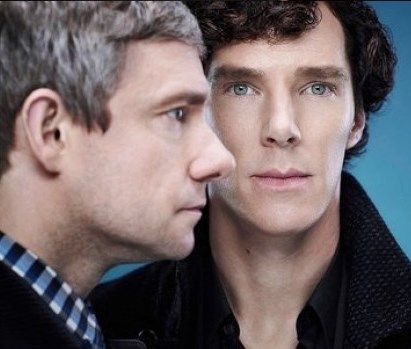
- From: Andover, Massachusetts
- Registered: June 8, 2012
- Posts: 1,721
Re: So what do you think about our Consulting Detective?
RavenMorganLeigh wrote:
I don't know-- it may be that I'm having trouble accepting John's reaction as reasonable-- because everyone else was happy to see Sherlock. :-) I think the moment that clinched it for me was Lestrade fiercly hugging Sherlock. Beautiful moment.
I have thought a lot about John's reaction to Sherlock coming back and also to the hints that are dropped about about how he fared during the two years he thought Sherlock was dead. My original thoughts at the end of Reichenbach were that John would grieve for a while, but as a soldier and a doctor who has seen death many times, I expected him to come to terms fairly quickly and move on. But that is not what happened. In the minisode "Many Happy Returns" he mentions that he's doing better but you can see he is still covering his grief. He has to pour a drink to fortify himself to watch the CD. He is clearly not all the way back and I think the minisode takes place about 6 months before Sherlock returns. He confesses to Mary in the restaurant that the last two years have been difficult for him and she has been the best thing that's happened to him. She agrees that she is, which I see as her gentle way of saying "Yes, John, I am the best thing. I've gone to the grave with you and held your hand. Now it's time to move on with me". Bottom line, John grieved much longer and harder then I thought he would - much more than I'm picturing a guy over the loss of a friend. It seemed so much more. What this felt like to me was a husband grieving for a spouse. So when he learned that Sherlock was faking and that others knew except him, John was wounded to the core. He had spent two very difficult years grieving his heart out only to have Sherlock waltz back in disguised as a silly waiter and making light of the mustache. No wonder he was livid and went ballistic. He was hurt by Sherlock the most because he loved him the most. And as for going ballistic - that's definitely a guy thing - and also is quite good entertainment. "Reasonable" flies out the window in a show like this where all reactions are heightened for the entertainment value.
Last edited by KeepersPrice (January 7, 2014 3:14 am)
---------------------------------------------------------------------------------------------------------------------------------------------
And I said "dangerous" and here you are.
You. It's always you. John Watson, you keep me right.

- RavenMorganLeigh
- Official Blogger
 Offline
Offline 
- From: Seattle, WA, USA
- Registered: December 25, 2013
- Posts: 1,575
Re: So what do you think about our Consulting Detective?
KeepersPrice wrote:
RavenMorganLeigh wrote:
I don't know-- it may be that I'm having trouble accepting John's reaction as reasonable-- because everyone else was happy to see Sherlock. :-) I think the moment that clinched it for me was Lestrade fiercly hugging Sherlock. Beautiful moment.
I have thought a lot about John's reaction to Sherlock coming back and also to the hints that are dropped about about how he fared during the two years he thought Sherlock was dead. My original thoughts at the end of Reichenbach were that John would grieve for a while, but as a soldier and a doctor who has seen death many times, I expected him to come to terms fairly quickly and move on. But that is not what happened. In the minisode "Many Happy Returns" he mentions that he's doing better but you can see he is still covering his grief. He has to pour a drink to fortify himself to watch the CD. He is clearly not all the way back and I think the minisode takes place about 6 months before Sherlock returns. He confesses to Mary in the restaurant that the last two years have been difficult for him and she has been the best thing that's happened to him. She agrees that she is, which I see as her gentle way of saying "Yes, John, I am the best thing. I've gone to the grave with you and held your hand. Now it's time to move on with me". Bottom line, John grieved much longer and harder then I thought he would - much more than I'm picturing a guy over the loss of a friend. It seemed so much more. What this felt like to me was a husband grieving for a spouse. So when he learned that Sherlock was faking and that others knew except him, John was wounded to the core. He had spent two very difficult years grieving his heart out only to have Sherlock waltz back in disguised as a silly waiter and making light of the mustache. No wonder he was livid and went ballistic. He was hurt by Sherlock the most because he loved him the most. And as for going ballistic - that's definitely a guy thing - and also is quite good entertainment. "Reasonable" flies out the window in a show like this where all reactions are heightened for the entertainment value.
Actually, your comment helps me re-think that a little. :-) I feel a little better....
- SilverMoonDragonB
- High Functioning Sociopath
 Offline
Offline 
- From: Ontario, Canada
- Registered: May 21, 2013
- Posts: 3,228
Re: So what do you think about our Consulting Detective?
KeepersPrice wrote:
RavenMorganLeigh wrote:
I don't know-- it may be that I'm having trouble accepting John's reaction as reasonable-- because everyone else was happy to see Sherlock. :-) I think the moment that clinched it for me was Lestrade fiercly hugging Sherlock. Beautiful moment.
I have thought a lot about John's reaction to Sherlock coming back and also to the hints that are dropped about about how he fared during the two years he thought Sherlock was dead. My original thoughts at the end of Reichenbach were that John would grieve for a while, but as a soldier and a doctor who has seen death many times, I expected him to come to terms fairly quickly and move on. But that is not what happened. In the minisode "Many Happy Returns" he mentions that he's doing better but you can see he is still covering his grief. He has to pour a drink to fortify himself to watch the CD. He is clearly not all the way back and I think the minisode takes place about 6 months before Sherlock returns. He confesses to Mary in the restaurant that the last two years have been difficult for him and she has been the best thing that's happened to him. She agrees that she is, which I see as her gentle way of saying "Yes, John, I am the best thing. I've gone to the grave with you and held your hand. Now it's time to move on with me". Bottom line, John grieved much longer and harder then I thought he would - much more than I'm picturing a guy over the loss of a friend. It seemed so much more. What this felt like to me was a husband grieving for a spouse. So when he learned that Sherlock was faking and that others knew except him, John was wounded to the core. He had spent two very difficult years grieving his heart out only to have Sherlock waltz back in disguised as a silly waiter and making light of the mustache. No wonder he was livid and went ballistic. He was hurt by Sherlock the most because he loved him the most. And as for going ballistic - that's definitely a guy thing - and also is quite good entertainment. "Reasonable" flies out the window in a show like this where all reactions are heightened for the entertainment value.
My thoughts exactly ^
-------------------------------------------------------
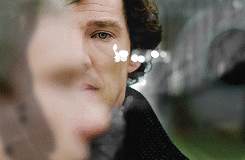
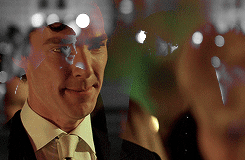
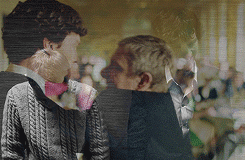
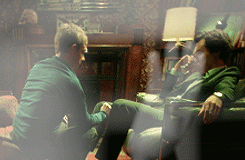
- Ormond Sacker
- John's Army
 Offline
Offline - From: Denmark
- Registered: September 29, 2013
- Posts: 329
Re: So what do you think about our Consulting Detective?
KeepersPrice wrote:
RavenMorganLeigh wrote:
I don't know-- it may be that I'm having trouble accepting John's reaction as reasonable-- because everyone else was happy to see Sherlock. :-) I think the moment that clinched it for me was Lestrade fiercly hugging Sherlock. Beautiful moment.
I have thought a lot about John's reaction to Sherlock coming back and also to the hints that are dropped about about how he fared during the two years he thought Sherlock was dead. My original thoughts at the end of Reichenbach were that John would grieve for a while, but as a soldier and a doctor who has seen death many times, I expected him to come to terms fairly quickly and move on. But that is not what happened. In the minisode "Many Happy Returns" he mentions that he's doing better but you can see he is still covering his grief. He has to pour a drink to fortify himself to watch the CD. He is clearly not all the way back and I think the minisode takes place about 6 months before Sherlock returns. He confesses to Mary in the restaurant that the last two years have been difficult for him and she has been the best thing that's happened to him. She agrees that she is, which I see as her gentle way of saying "Yes, John, I am the best thing. I've gone to the grave with you and held your hand. Now it's time to move on with me". Bottom line, John grieved much longer and harder then I thought he would - much more than I'm picturing a guy over the loss of a friend. It seemed so much more. What this felt like to me was a husband grieving for a spouse. So when he learned that Sherlock was faking and that others knew except him, John was wounded to the core. He had spent two very difficult years grieving his heart out only to have Sherlock waltz back in disguised as a silly waiter and making light of the mustache. No wonder he was livid and went ballistic. He was hurt by Sherlock the most because he loved him the most. And as for going ballistic - that's definitely a guy thing - and also is quite good entertainment. "Reasonable" flies out the window in a show like this where all reactions are heightened for the entertainment value.
^Definitely agree with this.
About Sherlock's laughter in the tube scene has it occured to anyone that it might be a brief hysterical breakdown from everything he's been through?
After all, if the incident with the Serbs are anything to go by, the last two years of his life have been pretty hellish, enough to make anyone snap. When he comes back to London he tries to get his life back together, but the one he wants back the most, John, won't even speak to him. He tries to make the best of things, but wear shows on him.
Then there's the tube incident itself. I don't know if Sherlock figured out that there might be an off-switch, if you ask me his "all bombs has an off-switch" is nothing more than his perpetual need to be perfect, if it occured to him during the "mind palace" scene or during the actual searching of the bomb, but even if it's the first there was a few moments where he believed that he and John were going to die. And I think his emotions during the subsequent apology is genuine, he is just creating a scene where John will actually listen to him. Manipulative as hell yes, but not necessarily untruthful.
And now for the laughing irself. With all of the above, two years of stressed life, a best friend who turns away from him, a near death experience, an emotional apology and then realising that, a) he has John's forgiveness, and b) they're both safe, I think Sherlock's selfcontrol snaps. He simply has a hysterical breakdown, a brief one but a breakdown nonetheless. I also think John recognises it for what it is, he was a soldier and doctor both, in an active warzone. He have probably seen other people breakdown in more spectacular ways, may even have done so himself. So he forgives Sherlock for laughing, becuase he realises why the man is doing it.
---------------------------------------------------------------------------------------------
Is it nice not being me? It must be so relaxing.
An apostrophe makes the difference between a business that knows its shit, and a business that knows it's shit.
- Mattlocked
- One More Miracle
 Offline
Offline 
- From: Germany
- Registered: June 29, 2012
- Posts: 6,781
Re: So what do you think about our Consulting Detective?
Yeah, could be.......... but still I think a hysterical breakdown would look/sound different.
__________________________________
"After all this time?" "Always."
Good bye, Lord Rickman of the Alan
- SolarSystem
- Threatened Knighthood
 Offline
Offline - From: Germany
- Registered: July 30, 2013
- Posts: 10,650
Re: So what do you think about our Consulting Detective?
Interesting, Ormond. So far Sherlock's laughter at the end of that scene has just pissed me off completely, I really haven't been able to warm to it. I think I'll have to watch it again while keeping in mind what you just wrote. ![]()
___________________________________________________
"Am I the current King of England?
"I see no shame in having an unhealthy obsession with something." - David Tennant
"We did observe." - David Tennant in "Richard II"
- •
- SusiGo
- The game is never over (moderator)
 Offline
Offline 
- From: Germany
- Registered: June 5, 2012
- Posts: 22,969
Re: So what do you think about our Consulting Detective?
Good point, Ormond. I think we do not have to love his reaction but to understand it would be enough. And to me this scene including the laughter is much more forgiveable than the lab experiment in Hounds which was coolly planned and executed just for the sake of solving a case. This time time it is about saving his friendship with John.
------------------------------
"To fake the death of one sibling may be regarded as a misfortune; to fake the death of both looks like carelessness." Oscar Wilde about Mycroft Holmes
"It is what it is says love." (Erich Fried)
“Enjoy the journey of life and not just the endgame. I’m also a great believer in treating others as you would like to be treated.” (Benedict Cumberbatch)

- butterfly grl
- John's Army
 Offline
Offline 
- From: at work most likely, in Texas
- Registered: May 16, 2013
- Posts: 300
Re: So what do you think about our Consulting Detective?
Mouse wrote:
anjaH_alias wrote:
And, btw., that Sherlock is laughing about John´s fear and pain is to me not more cruel than his Baskerville lab experiment. The only new thing is the laughter itself.
The Baskerville scene left a bad taste in my mouth, too. I mean, come on, John has PTSD. But I felt the train scene was much worse because:
1. Sherlock was testing a theory in Baskerville (this is in-canon - Stamford tells Watson in "A Study in Scarlet" that he wouldn't put it past Holmes to drug a friend for an experiment, though he adds he'd be just as likley to try it on himself). Sherlock was painfully relaxed while watching John's fear, but he didn't seem to enjoy it...he was more coldly clinical and detached. In the train, he was genuinely amused, laughed harder than we'd ever seen him.
2. Sherlock knew damn well how broken up John was over his "death." He admitted to overhearing him at the gravesite (I sort of wish he hadn't; it makes it more heinous to me that he lied to him for so long and expected an easygoing response when he got back after hearing that heartbreaking soliloquy). Plus, the way John read him the riot act during the reuion, and then Mary added her two cents. Sherlock knew John took it hard and was upset about the deception. To mock him for his feelings and negate everything he'd shared just seems supremely cruel.
3. He let John think he was about to die AGAIN, right after the thing with the bonfire. I know John's an adrenaline junkie, but that's overkill.
Man...the more I think about it, the more disappointed I am. I know Sherlock is not a warm and fuzzy guy (and in truth I don't really want him to be), but this is the first time I out-and-out disliked him. John is my favorite character and this episode made me not like him so much, either...I mean, c'mon, guy, why do you put up with this crap? You're an army officer and a doctor! His other friends must be horrible if he calls Sherlock his "best" friend. As the saying goes, "with friends like that, who needs enemies?"
I've questioned Sherlocks emotional investment in John ever since Baskerville. Does he care at all? Now with the train. ..
It's nice that Gatiss pays attention to the fan base, using so many fan theories - which imho made the episode uneven - but Sherlock was just all over the place mentally and emotionally.
-------------------------------------------------------------------------------------------------
Beware of dragons for you are crunchy and go well with ketchup
Dr. Horribles sing along blog
You people all have to learn
This world is going to burn
Burn
(yeah, it’s two r’s. H, O, R, R, yeah right.)
Burn
- tonnaree
- The "B" is SILENT! (Mod)
 Offline
Offline 
- From: Atlanta, Georgia, USA
- Registered: May 31, 2013
- Posts: 9,270
Re: So what do you think about our Consulting Detective?
I think in Sherlock's current position it's not surprising for him to be mentally and emotionally all over the place.
----------------------------------------------------------------------
Proud President and Founder of the OSAJ.
Honorary German
"Anyone who takes himself too seriously always runs the risk of looking ridiculous; anyone who can consistently laugh at himself does not".
-Vaclav Havel
"Life is full of wonder, Love is never wrong." Melissa Ethridge
I ship it harder than Mrs. Hudson.


- butterfly grl
- John's Army
 Offline
Offline 
- From: at work most likely, in Texas
- Registered: May 16, 2013
- Posts: 300
Re: So what do you think about our Consulting Detective?
RavenMorganLeigh wrote:
I don't know-- it may be that I'm having trouble accepting John's reaction as reasonable-- because everyone else was happy to see Sherlock. :-) I think the moment that clinched it for me was Lestrade fiercly hugging Sherlock. Beautiful moment.
What name did Sherlock call Greg?
-------------------------------------------------------------------------------------------------
Beware of dragons for you are crunchy and go well with ketchup
Dr. Horribles sing along blog
You people all have to learn
This world is going to burn
Burn
(yeah, it’s two r’s. H, O, R, R, yeah right.)
Burn
- Mary Me
- High Functioning Sociopath
 Offline
Offline 
- From: Germany, Bonn
- Registered: January 8, 2013
- Posts: 3,250
Re: So what do you think about our Consulting Detective?
SusiGo wrote:
Good point, Ormond. I think we do not have to love his reaction but to understand it would be enough. And to me this scene including the laughter is much more forgiveable than the lab experiment in Hounds which was coolly planned and executed just for the sake of solving a case. This time time it is about saving his friendship with John.
Good point! The first time he was manipulative with John was to solve a case and this time it was about to save something much more valuable - his friendship with John. Wonderful character development.
~~~~~~~~~~~~~~~~~~~~~~~~~~~~~~~~~~~~~~~~~~
"Falling is just like flying, except there’s a more permanent destination."
"Sherlock Holmes is a great man, and I think one day—if we’re very very lucky—he might even be a good one."
"Would you like to-"
"-have dinner?"
"-solve crimes?"
"Oh"

- Sherli Bakerst
- British Government
 Offline
Offline 
- From: Where my imagination takes me
- Registered: May 31, 2012
- Posts: 728
Re: So what do you think about our Consulting Detective?
tonnaree wrote:
I think in Sherlock's current position it's not surprising for him to be mentally and emotionally all over the place.
Yes, I agree! And I think KeepersPrice's and Ormond Sacker's ideas on Sherlock's behavior and emotional state are also very plausible.
----------------------------------------------------------------------------------------------------------------------------------------------------------------
Life is either a daring adventure, or nothing. -- Helen Keller

